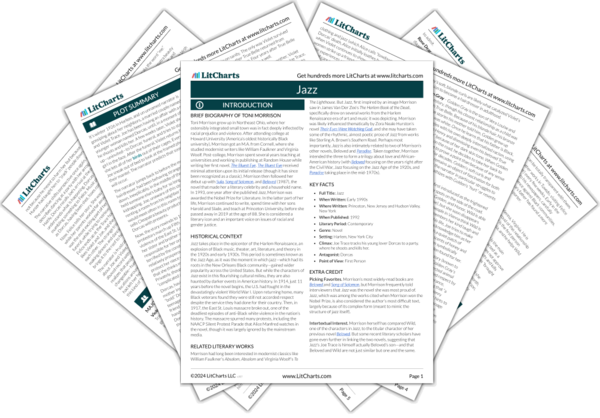Throughout Jazz, birds—particularly parrots—symbolize the pain of unrequited love. For years, as Violet and Joe find themselves increasingly isolated from each other, Violet speaks mostly to her parrot, whom she does not name; perhaps most saliently, when the parrot squawks “I love you,” Violet never replies. Violet’s inability to return her parrot’s declarations of love echoes not only Violet’s alienation from Joe, but also the alienation both of them have felt with their mothers—Violet because her mother Rose Dear committed suicide when Violet was a child, and Joe because his (probable) mother Wild never acknowledged him as her son. It is fitting, then, that in the beginning of the novel Violet and Joe banish the birds from their home, turning the now-empty bird cages in their apartment into an emblem of their shared (but unspoken) sense of loneliness. As the narrative progresses, however, Violet and Joe are able to articulate their mutual sense of abandonment and express their affection for each other, reciprocating love in exactly the way Violet was initially unable to do with her birds. And by the conclusion of Jazz, the Trace couple has decided to purchase a new bird, one they now carefully tend to and coo over—suggesting that this symbol of unrequited love has morphed into one of mutual care.
Birds Quotes in Jazz
Sth, I know that woman. She used to live with a flock of birds on Lenox Avenue. Know her husband, too. He fell for an eighteen-year-old girl with one of those deep down, spooky loves that made him so sad and happy he shot her just to keep the feeling going. When the woman, her name is Violet, went to the funeral to see the girl and to cut her dead face they threw her to the floor and out of the church. She ran, then, through all that snow, and when she got back to her apartment she took the birds from their cages and set them out the windows to freeze or fly, including the parrot that said, “I love you.”
All she saw, down in the cellar well beneath the stoop, was a light yellow feather with a tip of green. And she had never named him. Had called him my parrot all these years. “My parrot.” “Love you.” “Love you.” Did the dogs get him? Did some night-walking man snatch him up and take him to a house that did not feature mirrors or keep a supply of ginger cookies for him? Or did he get the message—that she said, “my parrot” and he said, “love you,” and she had never said it back or even taken the trouble to name him—and manage somehow to fly away.
Somebody in the house across the alley put a record on and the music floated into us through the open window. Mr. Trace moved his head to the rhythm and his wife snapped her fingers in time. She did a little step in front of him and he smiled. By and by they were dancing. Funny, like old people do, and I laughed for real. Not because of how funny they looked. Something in it made me feel I shouldn’t be there. Shouldn't be looking at them doing that.
[…] When they finished and I asked for my sweater, Mrs. Trace said, ‘Come back anytime. I want to do your hair for you anyway. Free. Your ends need clipping.’
Mr. Trace sat down and stretched. ‘This place needs birds.’












